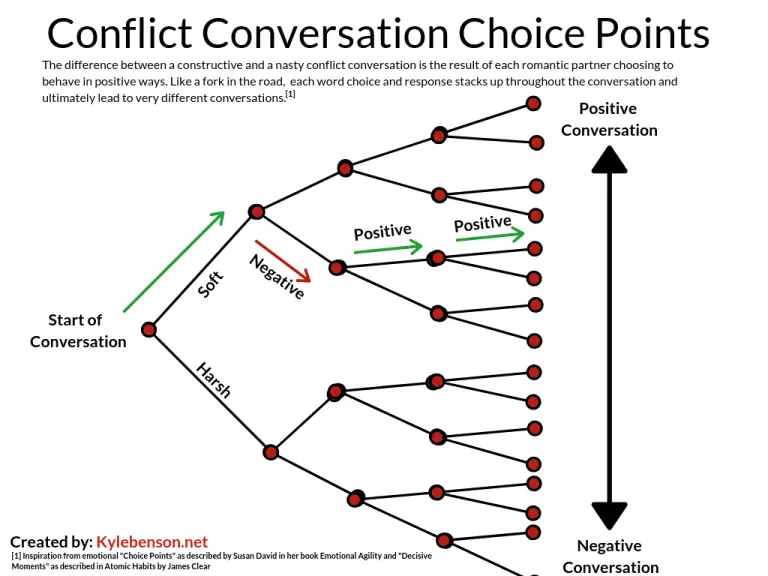Conflicts in relationships are very common and nothing to be scared of. Every individual is different from each other, and even though you might share a lot of similarities with them, both of you will not be completely identical.
When in a relationship, there are certain things your partner will do that will annoy you and vice-versa. However, instead of losing your temper entirely, focus on the problem and think about the best way to resolving a conflict. Otherwise, your problems will take a turn for the worse and your relationship will get to the point where it will be irreparable.
Have you ever taken an escalator? You start at the bottom and without paying attention to what’s actually going on, you move up and up.
It’s the same thing when it comes to escalating conflict.
Related: 9 Conflict Patterns That Damage Relationships
Conflict Escalation in a couple happens when each partner communicates in a way that leads to harsher comments, more intense emotions, and the volume going upwards, figuratively and literally.
The higher a couple rides the escalator, the more likely they are to say hurtful things they later regret. (1) This can be seen in something like the jump from arguing about whose turn it was to take the trash out to verbally attacking each other’s character or even making threats about leaving the relationship.
Threats tend to result from compounding unresolved issues, disconnection, and the longing to have some sense of control in the chaos of insecurity. Sadly, threats make things worse, not better.
Sometimes these hurtful conflicts can appear to be about nothing.
For example:
Steve: [Frustrated tone] Why is there a shovel left on the deck?
Janet: Knowing your ADD, you probably left it there like you always do. [Criticism]
Steve: I always pick up. You’re the one who leaves things around. Look at the three pairs of shoes scattered across the living room. You’re the lazy one. [Defensiveness]
Janet: Stop acting like a child and keeping score. Grow up. [Contempt]
Steve: Okay, Mom. I think I’ve outgrown being a child in this home. [Mocking tone]
Janet: Then move out.
Steve: I will.
Was this couple really ready to separate over a shovel?
When we look at the heart rates of couples who escalate the conflict, we’ll see at least one partner’s heart rate, like an escalator, go higher and higher, to the point where they become emotionally flooded. Typically, the rate is over 100 beats per minute.
At this point, humor, the ability to hear each other’s perspective, and problem-solving were left on the ground level.
If you have had a relationship conflict in which you did say something hurtful and you want to repair the relationship, then follow the guide The Aftermath of a Regrettable Incident here.
“Do you want real intimacy? Real fulfillment? Or do you want an emotionally charged relationship that swings up and down, over and over?” ―
The Warning Signs: The ABCs And Ds Of Conflict Escalation
The conflict escalates when partners attack each other using the ABCs – “accusation, blame, and coercion.” (2)
1. Accusation & Blame
The act of putting 100% of the responsibility for a problem on our partner and/or attacking our partner’s character as the cause of the problem.
When we do this, we allow our brain to engage in fault-finding and come to the conclusion that because of our partner’s moral issues, stupidity, or personal flaws, we are in this mess. Essentially, we are saying, “It’s 100% your fault we are in this and I have no responsibility. I’m innocent.”
Instead of a constructive conversation and a healthy resolution, we accuse our partners of being emotionally volatile or incompetent and blame them for the problem.
Examples:
“We wouldn’t be in this mess if it weren’t for your financial incompetence.”
“How could you be so stupid and leave the heater on full blast while no one is home. Our electric bill will cost us a fortune now.”
“The only reason our house is messy is that you’re a messy person.”
“Behind every happy couple lies two people who have fought hard to overcome all obstacles and interferences to be that way. Why? Because it’s what they wanted.” – Kim George
Related: There Are Two Views to Every Conflict and Both Are Valid
2. Coercion
A form of manipulation to force our partner to do something or change.
When accusations and blame don’t have the desired effect, partners often use coercion in an attempt to force their partner to change. Partners may nag consistently, make a demand, use threats, or drop guilt-tripping comments.
“When the other person hears a demand from us, they see two options: to submit or to rebel.” – Marshall Rosenberg, Nonviolent Communication: A Language of Life
A study on couples discovered that anxiously attached adults tend to use exaggerated expressions of hurt feelings and more guilt-inducing behaviors. (3) When their partners experienced the guilt, the anxiously attached person viewed the relationship as more positive.
The problem is their partners reported the relationship as unsatisfactory.
The study concluded that while manipulation may foster a short-term boost in intimacy and commitment, it erodes the relationship in the long term.
Often with coercion, the partner who is at the receiving end of this behavior gives in to simply gain some peace of mind. As the pattern repeats, it becomes a toxic cycle that creates a lack of freedom to be open and honest with each other. The more manipulation is used, the less power it has unless the stakes are raised, which is what people do.
For example, Stacey used to express irritation with a slightly raised voice, as this often got her a response from David. But now she uses ultimatums and practically yells them to get a reaction from David. (4)
Since David is conflict-avoidant, he complies but resents Stacey for it and emotionally distances himself from her. The farther he distances himself, the more she escalates. How they both approach conflict is destroying their relationship.
Coercive behavior reduces the safety of being emotionally open and connected, often leading to nasty conflicts about power and influence. It’s toxic to a romantic bond.
Other Examples
- “If you truly loved me, you’d do…”
- “You never care about me. If you did, you’d do…”
- Withdrawing emotionally to punish our partner for not doing something
- Attempts to make our partner jealous or insecure
3. Defensiveness
A counterattack to an accusation, blame, or coercion
When we are blamed or manipulated into doing something, it can lead us to feel defensive. We may have a desire to defend ourselves or point out faults in our partner. To learn about the nine types of defensiveness and the four remedies, go here.
“Great couples still get angry with each other, but they continue to discuss until there is a solution even if it takes several days.” -Bob Grant
The Two Cycles Of Escalation Caused by ABCs & Ds
Often in relationships, accusations and blame are met with defensiveness. As partners argue over whose fault it is and who is to blame, the conflict escalates out of control. This is where partners say hurtful things to each other and damage the relationship.
The second cycle is coercion being met with resentment. The more partners feel coerced, the more resentment builds. Even if a partner complies on the surface, inside they bottle their emotions. Eventually, the bottle explodes and the conflict escalator rises instantly.
Experiencing the ABCs of conflict once or twice likely isn’t going to cause a divorce, but when the cycle becomes a habitual way of communicating with each other, escalation becomes inevitable because partners are primed to react to each other’s ABCs and Ds.
Related: Help Your Partner Understand Your Side of the Conflict in 3 Steps
7 Tips To Stop Riding The Conflict Escalator
It’s practically impossible for a couple never to experience escalation during the conflict. The difference is that some couples are able to prevent escalation from causing damage to each other and the relationship, while other couples feel helpless and have not developed the necessary emotional regulation skills to self-soothe and step into their personal power during conversations.
Like a fork in the road, every choice of words, including the tone used, influences the type of conversation you’ll have. I call this Conflict Conversation Choice Points:

Below are seven steps you can take as a romantic partner to prevent escalation and take full responsibility for your actions in the relationship.
1) Self-Soothing
“One of the first places where communication breaks down is when we make it more complicated in our minds, increase our emotional arousal, and then go on to rationalize how reasonable it is to treat the other person badly.” – The High Conflict Couple: A Dialectical Behavior Therapy Guide to Find Peace, Intimacy, and Validation.
When people escalate, they tend to be emotionally flooded. It’s like an emotional dam breaks and emotions flood their words with anger, character attacks, and contempt. In order to prevent escalation within yourself, you need to be mindful of the signs that you are becoming emotionally flooded.
While this is different for everyone, a helpful way of telling if you are becoming emotionally flooded is by paying attention to how you are thinking about your partner. If you find yourself thinking about your partner in an overly negative and demeaning way, you’re probably becoming emotionally flooded. Dr. Gottman calls these thoughts “distress maintaining thoughts” because how you ruminate maintains the emotional distress.
Rather than getting the last word out, it’ll be most productive for you and your relationship to take a time out so you can soothe those distressing thoughts and replace them with relationship-enhancing thoughts.
“What if every moment of conflict is a chance to make your relationship even stronger?” ―
Related: How Resilient is Your Love During Relationship Conflicts- 10 Questions To Ask
2) Self-Responsibility
Van Epp states that there is a difference between being a jerk and acting like a jerk. We all act like jerks from time to time and say things that are not nice. It is easy for us to justify being mean to our partner by saying, “Well, they were mean to me, so I can be mean back to them.”
In order to de-escalate and have healthy constructive conflict, we have to leave that self-righteousness at the door, take responsibility for how we respond (see Conflict Choices Points above), and for what we choose to say or do.
3) Repair Attempt
Making a repair attempt is sort of like putting on a life jacket at the point when conflict feels like a sinking ship. You know that things are going wrong and you want to keep your relationship from drowning in negativity.
The goal of making a repair attempt is not to push the conflict under the rug or pretend it isn’t happening, but rather, it’s to bring the attention back to the topic at hand and focus on the main issue that the two of you were originally discussing.
“To be on the same page, we need to be in the same book.” ―
4) Five-Minute Conversation
According to Stan Tatkin, putting a limit on the amount of time you can engage in the fight can actually help you avoid escalation at the moment.
Allow yourselves five minutes to fight, and then at the end of five minutes, cut it off. You aren’t trying to solve the problem in five minutes, but cutting the conversation off, regrouping, and then revisiting later can keep it under control.

5) Speaker-Listener Technique
Both partners in the conflict have a responsibility to help keep the conflict de-escalated and moving in a positive and helpful direction. Take turns speaking about your perspective and also really listening to your partner’s perspective.
It’s important to help your partner understand your side of the conflict while also being able to listen to their perspective, all without allowing the conflict to escalate further. The two of you are working together to find a resolution, not working against each other.
6) State of the Union Meeting
Having a regular State of the Union Meeting, which involves understanding each other and working together to find a solution, can do wonders for the way that you handle conflict together. When you become proactive about the conflicts and problems within your relationship, these conflicts become less of an overwhelming thing for the two of you to handle.
Sitting down and having a calm discussion before the two of you have become upset, defensive, or escalated equips you both with the ability to handle the conflict in a healthier, more effective, and more clear-headed way.
NOTE: This does not mean that there will be no negativity in the relationship or during the conflict. It means that you both will have an understanding of how to approach the conflict. Little bits of negativity are unavoidable and even healthy, but how you talk and listen during this conflict is what’s important.
7) Get Help
If you find that after trying all of these steps you and your partner are still not able to de-escalate and have helpful and constructive conflict, it’s probably in your relationship’s best interest to reach out for professional help.
I would recommend looking for a therapist from the following Couples Therapist Directories: Gottman Therapists, Emotionally Focused Couples Therapists, PACT Therapists, and Imago Therapists.
“Compatibility doesn’t determine the fate of a marriage, how you deal with the incompatibilities, does.” ―
1. There are also several books that you can look into, including:
- Hold Me Tight
- The Seven Principles for Making Marriage Work
- Reconcilable Differences
- The High Conflict Couple
2. If you want a more hands-on experience, check out some course that the two of you can participate in, such as:
- Hold Me Tight Online
- Our Relationship
Don’t forget, a key way to maintain conflict and keep it from escalating is by taking a time-out. This allows partners to take some time apart and cool down to avoid escalation before returning to continue the conversation.
With love,
Kyle Benson
References:
1. It’s a common belief that people are most honest when they are angry, but I know that isn’t always the case for me, and it probably isn’t for the majority of people. ↩ 2. Reconcilable Differences Second Edition: Rebuild Your Relationship by Rediscovering the Partner You Love–without Losing Yourself ↩ 3. Overall, N. C., Girme, Y., Lemay, E. P., Jr., & Hammond, M. D. (2014). Attachment anxiety and reactions to relationship threat: The benefits and coss of inducing guilt in romantic partners. Journal of Personality and Social Psychology, 106, 235-256 ↩ 4. Sometimes it’s not even the words we use, but rather our nonverbal actions or tone of voice. ↩
Written by Kyle Benson Originally appeared in Kyle Benson











Leave a Reply